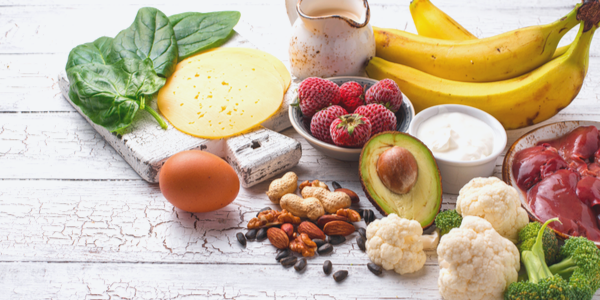
Biotin receives a lot of attention for its ability to spur hair growth, but what else does biotin do? In fact, this B vitamin exerts many important health functions.
Originating from the ancient Greek word "biotos," meaning life and sustenance, this article reveals why you will never have to wonder whether biotin is good for you ever again.
What Is Biotin?
Covertly known as vitamin H, biotin is considered a member of the B complex vitamins, some other ones being riboflavin (B2), niacin (B3), and cobalamin (B12).
The B complex vitamins, and especially biotin, help maintain optimal skin, hair, eye, liver, and nervous system health. and also help metabolize carbs, fat, and protein into usable energy (ATP). In addition, biotin is important for the embryonic development of fetuses, deeming it a critical nutrient during pregnancy.
Although beneficial bacteria in the large intestine can endogenously produce biotin, it is also present in a few foods like:
• Banana
• Brewer's yeast
• Cauliflower
• Cooked egg yolks
• Mushrooms
• Nuts- almonds, pecans, walnuts
• Organ meats
• Sardines
• Soybeans and legumes like peanuts
• Whole grains
Because food processing techniques can destroy biotin, less processed or raw versions of the above foods will contain more concentrated and potent biotin. Interestingly, though, raw egg whites contain a compound called avidin that interferes with the absorption of biotin. Furthermore, biotin is a water-soluble vitamin, meaning the body will not store it and there is little to no risk of toxicity.
Nonetheless, the recommended daily allowance (RDA) of biotin is about 30-100 micrograms (mcg)per day for adolescents and adults. Although it is possible to obtain enough biotin from whole food sources, some people still choose to take supplemental forms related to its touted beauty effects.
Just keep in mind the biotin supplement side effects nausea and other digestive upset, although there are no known toxicity symptoms. Simply put, it may take some trial and error to determine if an individual can tolerate a biotin supplement and the correct dosage for personal goals.
Biotin Deficiency
Although rarer than other nutrient deficiencies like vitamin D or iron, biotin deficiency is possible. The risk increases if consuming a nutrient-void diet high in ultra processed foods and low in whole foods like protein and vegetables.
Moreover, because biotin is naturally present in a variety of typically eaten foods, deficiencies can be due to a different underlying root cause. For instance, certain medications can reduce the absorption of biotin. Other rare causes include intestinal issues like Crohn's disease, long-term dieting, biotinidase enzyme deficiency, or genetic causes.
Lastly, because this B vitamin is responsible for a variety of functions, various side effects of biotin deficiency include:
• Dry or scaly skin and dry eyes
• Brittle hair or hair loss
• Rashes on the skin and cracking in the corners of the mouth
• Loss of appetite, nausea, and indigestion
• Insomnia and depression
• Muscle pain, fatigue, and difficulty walking
• Burning or tingling sensations in hands and feet
• Seizures (at its worst)
Biotin Benefits
While biotin is almost solely connected to its skin health and hair and nail growth abilities in the common wellness space, it exerts numerous other benefits. It is important to note that these exertions are related to additional biotin supplementation, and not whole food intake alone.
Maintaining Healthy Skin, Hair & Nail Health
Biotin supplementation renders effective hair, skin, and nail results because it helps the body produce keratin, a protein that promotes strong cells. For this reason, people often take additional biotin to help with hair growth and thinning hair and improve splitting or brittle toenails and fingernails.
Combined with zinc, amino acids, and other nutrients it has also been used to treat alopecia in children and adults.
Blood Sugar Balance
Preliminary research conducted on animals suggests biotin supplementation may help regulate blood glucose levels. This is especially when combined with chromium, a trace mineral.
In addition, it may also help prevent kidney damage and peripheral neuropathy - nerve damage in the feet, hands, legs, or arms - in those with autoimmune type 1 diabetes.
Although more research is warranted, this is promising research as the rise of diabetes, type 2 diabetes especially, is rampant.
Fetal Development
To promote proper neurological fetal development, taking a prenatal with sufficient biotin levels is smart. Behind folate, biotin is perhaps the second most important nutrient for pregnant women's embryonic growth and development.
Because super high levels of biotin could be harmful to the growing fetus, it is better to take a prenatal with this nutrient than isolated biotin.
Taste Restoration
Interestingly, a recent study purports that biotin supplementation of at least 10-20 mcg daily helped restore taste in those who lost it for any reason.
Again, although much more research is necessary to officially make this claim, it is quite pertinent considering the loss of taste is a common symptom of the Covid-19 virus.
The Takeaway
Part of the B complex group of vitamins, biotin is also categorized as vitamin B7 and oddly vitamin H, though H is the eighth letter of the alphabet? Otherwise, biotin is a pretty straightforward vitamin.
This vital nutrient elicits various health benefits, especially for the eyes, skin, hair, nails, liver, nervous system, and food metabolism. And although supplemental forms of biotin are often taken for its beauty effects, it can exert further function for blood sugar level balance, fetal development, and potentially taste restoration.
Finally, while overt biotin deficiency is rare, it is still wise to prioritize high-biotin foods like organ meats, sardines, legumes, and egg yolks to ensure adequate intake.
References:
Holland K. Biotin Deficiency: Side Effects, Causes, and More. Healthline. Updated June 27, 2017. https://www.healthline.com/health/biotin-deficiency.
Stevens C. Health Benefits of Biotin: What Does the Science Say? Healthline. Updated March 8, 2019, https://www.healthline.com/health/the-benefits-of-biotin#fetal-development.
Vitamin H (Biotin). Mount Sinai. https://www.mountsinai.org/health-library/supplement/vitamin-h-biotin.





